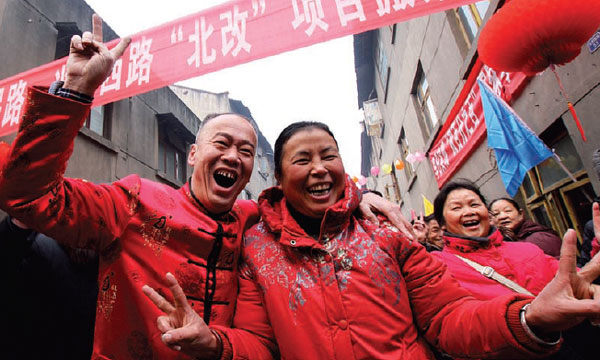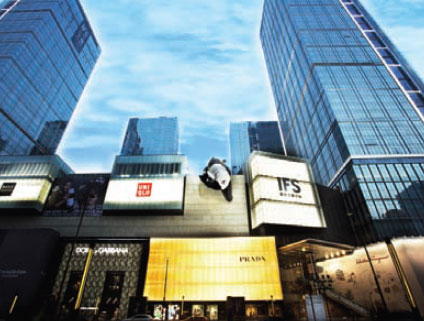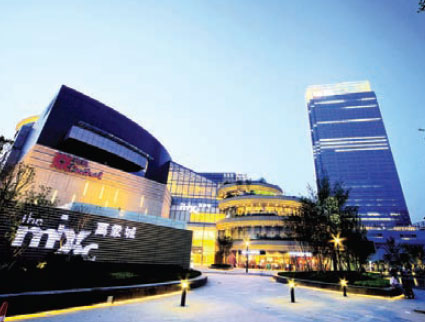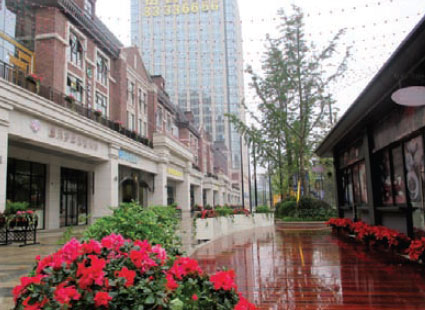Chengdu growth plan: Race to the future
|
Residents of Fuqin neighborhood, in Chengdu's Jinniu district, are excited about the start of their demolition and relocation program in January 2013. Photos Provided to China Daily |
As one of the fastest developing cities in China, Southwest China's Chengdu is popular with multinationals, scientific institutions and startup companies.
To further enhance its competitiveness and attractiveness, Chengdu aims to transform itself into an international metropolis with modern urban layout, high-end industries, beautiful ecological environment and a unique cultural atmosphere.
The city covers an area of 12,390 square kilometers and has a population of 14 million. It is also home to 268 Fortune Global 500 companies. Its GDP hit 1 trillion yuan ($156.6 billion) last year, 8.9 percent higher than in 2013, while the FDI was $10 billion.
Change has taken place in the north of the city since 2012, when the city government launched a livelihood project, aiming to renovate the shanty houses, old communities and markets in the north of the city to improve people's living environment.
The north of the city is traditionally an important commodity receiving and distribution center, gathering businesspeople from all over the country. However, as time passed, the houses and markets became old and shabby, public facilities no longer met people's needs, and the traffic needs improvement.
Liu Hui, a citizen who has moved into her new apartment, said she couldn't believe the fast change. She used to live in an old community near a street market, troubled by the bad traffic. Now her community is close to a subway and newly built commercial complexes.
Liu is also pleased that thousands of local residents are able to find jobs in the newly built shops, supermarkets, theaters, restaurants and hotels.
According to local authorities, the systematic plan is regarded as a pilot project to boost the transformation of the city's construction and management and a foundation project to build Chengdu into a modern international metropolis.
The project plans to build a"16 horizontal and 12 vertical" road network and nine metro lines in the north of the city, making the region modern in shape.
The region will mainly develop a modern service industry. The largest modern household business center, as well as the second Ikea store in Chengdu, will be located here.
During the renovation, the planners are paying critical attention to the preservation and inheritance of the city's unique culture. The ancient buildings and cultural landmarks are well protected and restored.
The ecological environment will also be improved. The region has built nine large-scale parks since 2012, and it's scheduled to build seven more parks and one ecological belt, and enlarge two reservoirs in the next two years.
World-class shopping
Taking advantage of its rich tourism and cultural resources, and the prosperous business districts, Chengdu aims to promote the integrative development of its commerce, tourism and cultural industries, thus building itself into a world-class tourist destination and shopping center.
With a history of nearly 3,000 years, Chengdu has a great number of historical sites, such as Jinsha Museum, the Shrine of the Marquis Wu, the Dujiangyan Irrigation System, and the Thatched Cottage of Du Fu.
The city is famous for giant pandas. The Chengdu Research Base of Giant Panda Breeding is home to more than 100 of them.
Named by UNESCO as a "City of Gastronomy", Chengdu is also well-known for its spicy and diverse cuisine. Many famous Chinese dishes, including mapo tofu and kung-pao chicken, originated in Chengdu.
In January, the New York Times named Chengdu as one of the"52 places to go in 2015".
Chengdu is one of a few cities in China that smoothly combine traditional culture with modern and foreign elements.
Sino-Ocean Taikoo Li Chengdu, a new 100,000-square-meter shopping center in the city's downtown area, is a combination of ancient buildings and streets, traditional and modern architectural style, and international fashion and lifestyle brands.
It boasts international fashion brands including Gucci, Cartier and Ralph Lauren, and lifestyle brands like Fangsuo bookstore, the Beast Shop, and Michelin Star restaurant.
Just a street away, Chengdu International Finance Square opened in January last year - housing a cluster of about 300 luxury fashion labels.
Including Sino-Ocean Taikoo Li Chengdu and Chengdu International Finance Square, the city's central business district has attracted more than 400 international first-and second-line brands and nearly 600 regional flagship stores, ranking first in the central and western regions.
Contact the writers through pengchao@chinadaily.com.cn
|
Chengdu International Finance Square in downtown Chengdu opened in January 2014. |
|
The Mixc mall is the largest of the newly built commercial complexes in the renovation project. |
|
Xingfuli Business Street, renovated during the livelihood improvement project, has become one of the most beautiful streets in Sichuan province. |
(China Daily 10/29/2015 page23)


















